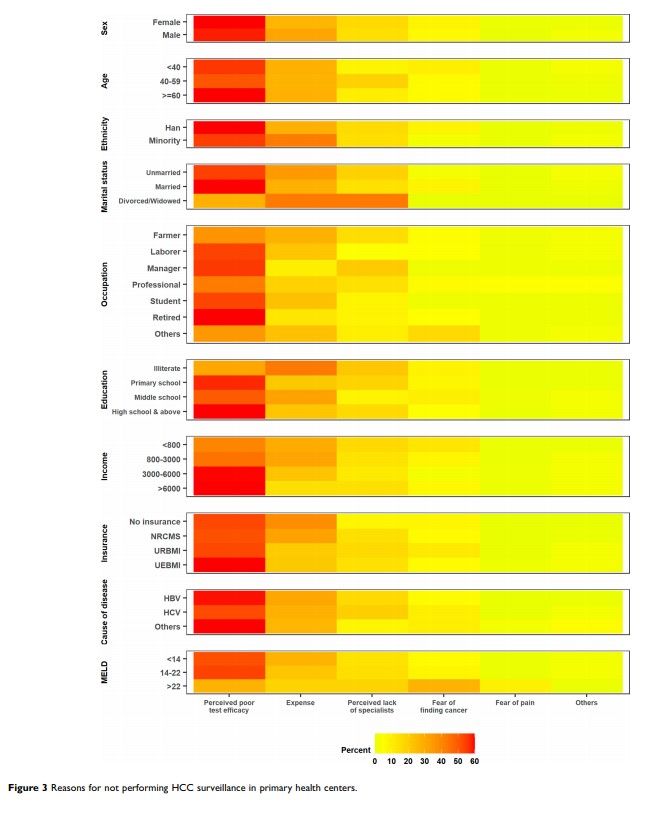9 1 2 3 6
论文已发表
注册即可获取德孚的最新动态
IF 收录期刊
- 2.6 Breast Cancer (Dove Med Press)
- 3.9 Clin Epidemiol
- 3.3 Cancer Manag Res
- 3.9 Infect Drug Resist
- 3.6 Clin Interv Aging
- 4.8 Drug Des Dev Ther
- 2.8 Int J Chronic Obstr
- 8.0 Int J Nanomed
- 2.3 Int J Women's Health
- 3.2 Neuropsych Dis Treat
- 4.0 OncoTargets Ther
- 2.2 Patient Prefer Adher
- 2.8 Ther Clin Risk Manag
- 2.7 J Pain Res
- 3.3 Diabet Metab Synd Ob
- 4.3 Psychol Res Behav Ma
- 3.4 Nat Sci Sleep
- 1.9 Pharmgenomics Pers Med
- 3.5 Risk Manag Healthc Policy
- 4.5 J Inflamm Res
- 2.3 Int J Gen Med
- 4.1 J Hepatocell Carcinoma
- 3.2 J Asthma Allergy
- 2.3 Clin Cosmet Investig Dermatol
- 3.3 J Multidiscip Healthc

中国云南省高危慢性肝病患者对肝细胞癌监测的依从性和感知障碍
Authors Dai J, Zhao J, Du Y, Zhuang L, McNeil EB, Chongsuvivatwong V
Received 29 April 2020
Accepted for publication 9 July 2020
Published 23 July 2020 Volume 2020:12 Pages 6209—6220
DOI https://doi.org/10.2147/CMAR.S259195
Checked for plagiarism Yes
Review by Single-blind
Peer reviewer comments 2
Editor who approved publication: Dr Seema Singh
Background: Data concerning adherence to hepatocellular carcinoma (HCC) surveillance among chronic liver disease (CLD) patients at high risk of developing HCC in China are limited. We aimed to examine the relationship between HCC-related knowledge dimensions and adherence to HCC surveillance procedures among chronic liver disease patients at high risk of developing HCC and to identify potential barriers.
Methods: A total of 380 patients with chronic liver disease at high risk of developing HCC were recruited between May and August 2018 to complete a survey during the first week of their first hospitalization at the Third People’s Hospital of Kunming in China. We followed up each patient up to 7 months by telephone to confirm whether the patient returned to complete investigations for HCC surveillance. Patient’s socio-demographic characteristics, HCC-related knowledge, and perceived barriers to HCC surveillance were measured using a structured questionnaire during their hospitalization. Factor analysis was performed on the knowledge questions to reduce the dimensions. Univariate and multivariate analyses were performed to examine the association between dimensions of HCC-related knowledge and patients’ adherence to HCC surveillance.
Results: A total of 327 eligible patients had been successfully contacted in the follow-up phase. Only a quarter of patients completed HCC surveillance within 7 months after their first admission to hospital. High costs and perceived poor test efficacy were the two major barriers for HCC surveillance. Three common factors were derived from the factor analysis of HCC-related knowledge, namely, “Surveillance”, “Lifestyle”, and ‘Prognosis’. Knowledge of HCC surveillance and lifestyle but not prognosis had an influence on adherence to HCC surveillance. Patients with better surveillance and lifestyle knowledge domain had better adherence to HCC surveillance.
Conclusion: Adherence to HCC surveillance procedures is low in the study area. Closing the gap in HCC-related knowledge, particularly regarding surveillance and lifestyle, may help to increase adherence rates.
Keywords: HCC surveillance, adherence, knowledge, barriers
